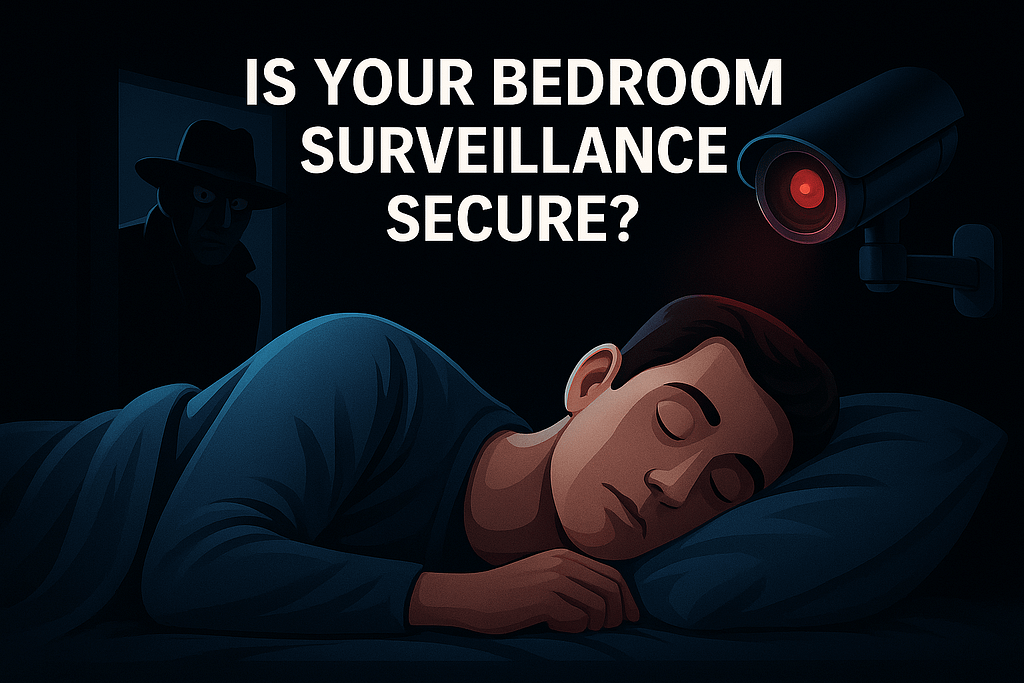
Introduction
Security cameras and smart devices are everywhere. They’re affordable, easy to install, and used not only in businesses and offices but also in bedrooms and private homes.
Some people use them to monitor pets. Others, to record their sleep or capture anything strange happening at night. Maybe you’ve installed one yourself—facing your bed, silently recording, even when you’re not fully dressed.
Here’s the uncomfortable truth: you could be streaming your most private moments to the internet without knowing it.
Many of these devices are connected to the cloud or Wi-Fi. And unless you’ve taken the time to configure them properly, they may be sending live feeds to servers, vulnerable to intrusion—or worse, already exposed.
So what role does a VPN really play in this scenario? And more importantly: can it actually protect your privacy, or is it just another layer that makes you feel safe?
This article explores the real risks of modern surveillance, how people unknowingly expose their homes, and what a VPN can—and can’t—do to help.
How You Can Actually Be Watched — And Why It’s More Common Than You Think
When people imagine being «spied on,» they think of elite hackers or advanced malware. But in most cases, it’s much simpler than that.
- Cameras left on with default passwords
- Apps granted camera and microphone access without reading the fine print
- Devices sending unencrypted streams to poorly managed servers
- Open ports on your router, allowing global access with just a link
Websites like Shodan.io let anyone search the internet for exposed devices. Type “webcam bedroom” and you’ll find live streams from cameras broadcasting in homes, stores, and offices—all because someone forgot to change a password or left a setting unchecked.
Now consider your mobile phone: always with you, always listening.
Privacy isn’t just at risk—it’s already compromised for many users.
5 Common Mistakes That Expose Your Privacy
1. Keeping the default password
If your camera still uses “admin” or “123456,” anyone can get in.
2. Enabling remote access without security layers
Some devices offer «view from anywhere» features—but also let anyone else do the same if settings aren’t restricted.
3. Using unknown or cheap brands
Ultra-cheap smart cameras often connect to remote servers with no encryption or security policy. You don’t even know who has access.
4. Never updating firmware
A known vulnerability won’t be fixed unless you install the latest patches. Outdated devices are easy targets.
5. Granting unnecessary app permissions
Does your flashlight app need microphone access? Probably not. But many apps ask, and most people tap «accept» without reading.
What a VPN Can—and Can’t—Do in This Context
✅ What a VPN can do:
- Encrypt your connection when accessing cameras remotely
If you’re checking feeds from outside your home, a VPN adds a secure tunnel between you and the network. - Hide your real IP address
This makes it harder for attackers or websites to trace your device location. - Protect your data on public Wi-Fi
Using your phone to monitor a camera from a café or hotel? A VPN ensures your activity isn’t exposed.
❌ What a VPN can’t do:
- It won’t fix poor device security
If your camera is exposed or has a weak password, a VPN can’t save you. - It won’t block unethical behavior by manufacturers
If your device sends data to third-party servers, the VPN doesn’t control what happens once it leaves. - It won’t patch outdated firmware
Only you can do that by staying updated and using reputable devices.
Bottom line:
A VPN is a powerful layer of protection—but it’s only part of a full privacy strategy.
Final Thoughts: It’s Not About Hiding—It’s About Taking Back Control
Technology brings convenience, but it also brings risk. Cameras you installed to feel safe may be quietly recording things you never intended to share.
You don’t need to be paranoid—just aware.
A VPN won’t solve everything. But it helps you reclaim visibility, reduce exposure, and take back a piece of your digital space.
Just like you close your curtains at night, a VPN helps you close a few windows the internet left wide open.
Privacy doesn’t have to be perfect. But it should be yours.